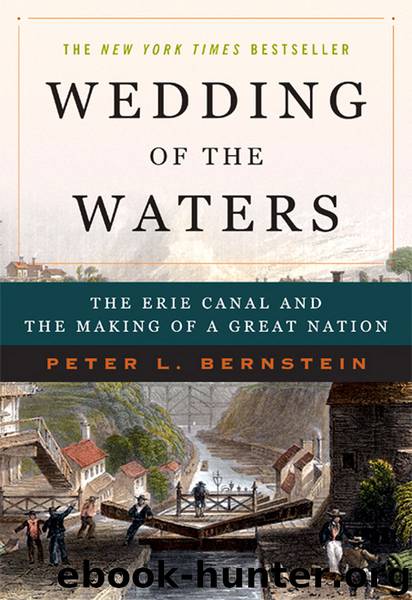Wedding of the Waters by Peter L. Bernstein

Author:Peter L. Bernstein
Language: eng
Format: epub
Publisher: W. W. Norton & Company
Published: 2005-03-11T16:00:00+00:00
Thus, in a dramatic example of the law of unintended consequences, a robust American business boom emerged from the ashes of Washington, D.C., and the panic created by the fearsome aggressions of Lord Bathurst and General Ross in August 1814. The new monetary system may have developed out of tragedy, panic, and confusion, but by liberating the banks from the restraints of specie, it converted the traditionally scowling banker into a smiling gentleman only too happy to accommodate eager borrowers by printing as many banknotes as they required.
“The plenty of money…was so profuse,” reported a committee of the Pennsylvania legislature, “that the managers of the banks were fearful that they could not find a demand for all they could fabricate, and it was no infrequent occurrence to hear solicitations urged to individuals to become borrowers, under promises of indulgences most tempting.”5 According to Albert Gallatin, banknotes in circulation grew from $28 million in 1811 to $68 million in 1816, a compound growth rate of 19 percent a year.6 The number of banks in the United States jumped from 88 in 1811 to 208 four years later. Pennsylvania incorporated 41 banks just in the month of March 1814. By 1818, the nation would have 392 banks.7
But the flood of paper money evoked nightmares among conservative people who believed the only good money was scarce money. The gush of banknotes into circulation reminded them of the collapse of the currency from overissue during the Revolution, when the expression, “not worth a Continental” was about as abusive a statement as one could make in polite company. These concerns reached Congress, where Representative John C. Calhoun warned that banks could go on granting credits ad infinitum even if they did not have a single dollar in their vaults.
Congress responded by establishing the second Bank of the United States in 1816 and opening it up for business the following year—another milestone in that remarkable year 1817—thereby reinventing an institution rudely rejected from the system six years earlier. The first Bank of the United States, Alexander Hamilton’s brainchild, had been abolished in March 1811, its twentieth year of existence, in a wave of Jeffersonian antipathy to anything related to that four-letter word “bank.” “I have ever been the enemy of banks,” Jefferson had confided to John Adams.8 He considered banks an even greater threat to liberty than standing armies.
There was little difference between this bank and its predecessor, except that it was larger and its charter contained about three times as many words. But by reestablishing a Bank of the United States, which would correct the conditions of the currency by both influence and example, the authorities hoped to restore order out of a system running away with itself. One of its first rules would be to refuse the notes of any bank that did not pay in gold or silver.9
The Bank was to be the principal depository for the federal government, which meant that is where tax payments ended up. The Bank was authorized to
Download
This site does not store any files on its server. We only index and link to content provided by other sites. Please contact the content providers to delete copyright contents if any and email us, we'll remove relevant links or contents immediately.
Learning SQL by Alan Beaulieu(6291)
Weapons of Math Destruction by Cathy O'Neil(6281)
Digital Minimalism by Cal Newport;(5765)
iGen by Jean M. Twenge(5416)
Sapiens by Yuval Noah Harari(5372)
The Age of Surveillance Capitalism by Shoshana Zuboff(4293)
Elon Musk by Ashlee Vance(4128)
Thing Explainer by Randall Munroe(3941)
Apollo 8 by Jeffrey Kluger(3709)
Future Crimes by Marc Goodman(3600)
The Science Book (Big Ideas Simply Explained) by DK(3287)
The Innovators: How a Group of Hackers, Geniuses, and Geeks Created the Digital Revolution by Walter Isaacson(3214)
Who Can You Trust? by Rachel Botsman(3133)
I Live in the Future & Here's How It Works by Nick Bilton(2997)
Infinite Energy Technologies by Finley Eversole(2986)
Steve Jobs by Walter Isaacson(2899)
Dawn of the New Everything by Jaron Lanier(2772)
Chernobyl by Serhii Plokhy(2539)
Ben Franklin's Almanac by Candace Fleming(2531)
